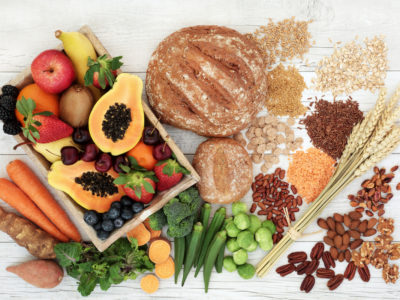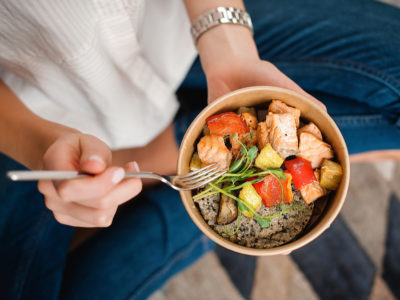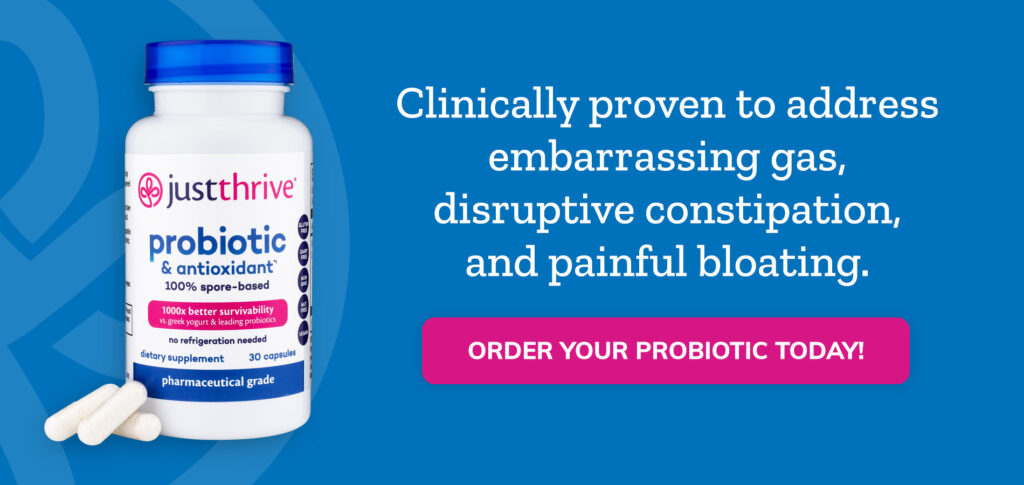Table of Contents[Hide][Show]
- Occasional Versus Chronic Constipation
- Constipation Symptoms
- Risk Factors for Constipation
Seven Effective Cures for Constipation+−
- 1. Drink More Water!
- 2. Sip a Warm Drink
- Probiotic Tea: Everything You Need to Know
- 3. Get Active
- 4. Eat Fiber-Rich Foods
- Fiber 101: An In-Depth Guide
- 5. Try a Spore-Based Probiotic
- 6. Don’t Fight the Urge to Go
- 7. Eliminate Constipation-Causing Foods
- 6 Things Your Poop Color Is Telling You About Your Gut Health
- How to Start Eating Healthier
- Anxiety and the Gut: How They’re Connected
Almost everyone goes through it at some point: bloated tummy, cramping, and gastric discomfort. And when you finally head to the bathroom for relief, nothing.
Constipation is surprisingly common: roughly 16% of all adults have symptoms of constipation. And that number more than doubles to 33% when you look at adults over the age of 60.
But you don’t have to suffer—and you don’t have to turn to over-the-counter drugstore solutions.
Let’s take a look at constipation—its symptoms, its causes, and most importantly, how you can get things moving again with some natural remedies and constipation relief.
Occasional Versus Chronic Constipation
Almost everyone experiences occasional constipation from time to time. Whether it’s due to binding foods (more on that below!) or an illness, you wake up one day and realize that you haven’t had a bowel movement in quite some time.
It can happen to anyone after a few days of less-than-optimal eating, a few parties in a row, or other “life things” that can simply throw off your bodily systems from time to time.
Unfortunately, for some people, this becomes more of an every day (or every week) situation. If you have infrequent, difficult, or painful bowel movements for several weeks, you might have chronic constipation. If you consistently have fewer than three bowel movements per week, you might fall into the “chronic” camp.
Let’s dive into how you can alleviate both occasional and chronic constipation.
Constipation Symptoms
We all know the main symptom of constipation: you simply can’t “go.” And that’s certainly the biggest sign that you’re having a bout of occasional constipation.
But chronic constipation isn’t always a complete lack of bowel movements. In fact, you might be going to the bathroom every 2-3 days, yet still be experiencing chronic constipation, from a medical point of view. (The “healthy” range is somewhere averaging at least once per day.)
Here are some of the most common chronic constipation symptoms:
- Three or fewer bowel movements per week
- Stool that is lumpy or hard
- Very small stools
- Straining to pass stool
- Feeling as though something is blocking or preventing your bowel movements
- Feeling as though you haven’t thoroughly emptied your rectum, even after using the bathroom
- Needing physical help to empty your rectum (for example, pressing on your abdomen, etc.)
If you experience two or more of the symptoms of constipation for the last three months, chances are you have chronic constipation.
Chronic Constipation Causes
When your waste moves too slowly through your digestive tract or takes too long to be eliminated, it could become hard or dry. This can make bowel movements difficult or even painful.
What can cause that to happen often enough for your condition to be considered chronic? Here are the most common causes of constipation:
Lifestyle
- Changes in your physical activities
- High stress levels
- Pregnancy
- Resisting the need to use the bathroom (“holding it in”)
- Sedentary lifestyle, not enough exercise
Food/Drink
- A lack of dietary fiber
- Eating foods that are known to cause constipation (i.e. dairy)
- Eating disorders
- Not drinking enough water
- Sudden dietary changes
Medications
- Antacids containing calcium or aluminum
- Certain medications, including iron pills, antidepressants, and strong pain medicine
- Overuse of laxatives
Digestive Health Issues
- Anal fissures (tiny tears in the skin around the anus)
- Bowel obstructions
- Bowel strictures (narrowing of the colon)
- Colon cancer
- Inability to relax the pelvic muscles to allow bowel movements
- Rectal cancer
- Weakened pelvic muscles
Other Medical Issues
- Diabetes
- Eating disorders
- Hypercalcemia (excessive calcium in your blood)
- Hyperparathyroidism (overactive parathyroid gland)
- Hypothyroidism (an underactive thyroid)
- Irritable Bowel Syndrome (IBS)
- Issues with the nerves or muscles of your digestive system
- Neurological conditions, i.e. Parkinson’s disease or multiple sclerosis
- Spinal cord injury
- Stroke
Risk Factors for Constipation
While anyone can experience the occasional bout of constipation, there are some risk factors that could make you predisposed to a chronic condition.
These include:
- Advanced age
- Being female
- Obesity
Seven Effective Cures for Constipation
If you are experiencing the pain or discomfort of not being able to eliminate waste, constipation relief can be found.
Laxatives are commonly used to bring on bowel movements. However, you might want to rethink that; their overuse can actually make the situation even worse! Stimulant laxatives can have side effects that cause long-term damage to your digestive system, making it even more challenging to eliminate waste regularly.
Instead of relying on a medication, a constipation home remedy could be just the thing to get your digestive system back in action.
1. Drink More Water!
Dehydration is one of the biggest causes of constipation. When you’re dehydrated, your intestines won’t contain enough water to add to your stool. The dry, hard stool is more difficult to pass and leads to constipation.
Hydration is key to being regular. Aim for 6-8 eight-ounce glasses of water per day to stay hydrated and keep your bowels moving.
2. Sip a Warm Drink
Warm liquids stimulate your bowels and widen blood vessels, both of which can help ease your constipation. Try sipping hot tea or warm water with lemon juice in the morning, to give your body time to respond during the day.
Related
Probiotic Tea: Everything You Need to Know
In this post, we’ll answer all your questions about probiotic tea, including what’s in it and how it can support both the digestive system and immune health.
3. Get Active
A sedentary lifestyle is a huge contributor to chronic constipation. But when you’re active, your whole body gets warmed up and moving—including your intestines.
If you’re tied to a desk most of the day, make sure you find time to move your body most days of the week. It doesn’t need to be a hardcore workout, either. Even a walk at lunchtime or in the evening can be effective.
4. Eat Fiber-Rich Foods
Just as there are foods that can cause constipation, there are plenty of delicious foods that will encourage bowel movements. For the most part, these are the best high-fiber foods.
Soluble fiber increases the weight and bulk of your stool, making it easier to pass. It also works as a stool softener, so bowel movements are easier and less painful.
Some of our favorite fiber-rich foods include:
- Fruit: berries, oranges, apples with the skin, pears, prunes (prune juice is especially effective as a natural laxative to treat constipation)
- Vegetables: carrots, broccoli, green peas, collard greens
- Whole grains: oatmeal, bran cereal
- Legumes: lentils, chickpeas, and black beans
- Nuts and seeds: almonds, peanuts, pecans, flax seeds, chia seeds
Not sure if you’re getting enough fiber? Check the daily recommendations:
- Men age 50 or younger: 38 grams
- Women age 50 or younger: 25 grams
- Men age 51 or older: 30 grams
- Women age 51 or older: 21 grams
If you can’t get enough fiber through food, you could also take a natural fiber supplement such as psyllium (Metamucil). This is a non-fermentable soluble fiber that is safe and effective for treating constipation.
But be aware that too much of a good thing isn’t a good thing; avoid the temptation to go too far over the recommended fiber intake. Going overboard with your fiber can lead to other health issues, including bloating, abdominal pain, and even more digestive issues.
Related
Fiber 101: An In-Depth Guide
Learn the difference between soluble and insoluble fiber, the best way to add it to your diet (as well as what to avoid), and some of its biggest health benefits of fiber.
5. Try a Spore-Based Probiotic
Probiotic supplements help balance your gut microbiome, which houses the majority of the bacteria in your body.
Your gut only has so much room for bacteria. When the “bad” bacterial colonies are larger and stronger, they crowd out the “good” bacteria. The result is gut imbalance, medically known as dysbiosis. This incredibly common condition causes a huge range of gastrointestinal issues, including constipation.
Probiotic supplements contain strains of good (or beneficial) bacteria. These boost the strength of the good bacteria in your gut and encourage them to thrive. Ultimately, the good bacteria will outnumber the bad bacteria, and you’ll regain the right bacterial balance.
When choosing your supplement, look for spore-based probiotics. These probiotics are soil-based microorganisms that are found naturally in vegetation or dirt. They are much more stable than other strains of probiotics, which enables them to survive the harsh acids in your stomach on their journey to your gut.
The survivability of spore-based probiotics makes them a much more effective solution for eliminating digestive issues.
6. Don’t Fight the Urge to Go
It can happen to everyone: you need to go to the bathroom, but there isn’t one around. Or you’re in a situation where you feel embarrassed. Some people shun public bathrooms altogether and wait until they’re at home.
Unfortunately, “holding it in” regularly can cause chronic constipation and even bring on constipation pain.
When you resist the urge to go, your rectal muscles push your waste back into your colon. But when that happens, the water that was softening your stool is absorbed back into your body. This causes your stool to dry out, making it more difficult for you to have a bowel movement.
So, whenever possible, just go when you’ve got to go.
7. Eliminate Constipation-Causing Foods
Earlier we talked about which foods you should add to your diet. Now, let’s discuss some of the foods you should avoid.
- Dairy products, including milk and cheeses. One exception would be yogurt, especially if it’s a probiotic-rich version.
- Fast food and prepared foods, which are usually low in fiber
- Fried foods, because the high fat content makes them harder to digest
- Eggs, which are low in fiber. But you can make omelets with high-fiber additions such as spinach or tomatoes.
- Tender meats, which are high in protein and fat but low in fiber
- Treats that are high in sugar and fat, making them difficult to digest. Trade your cupcake for a yummy yogurt-berry parfait.
- White bread or other white grains. Choose the whole-grain version for fiber.
- Alcohol, which dehydrates your body and leads to hard, dry stool.
Remember, you don’t have to give these foods up completely, just limit them within your diet.
Final Thoughts
Although some demographics are at higher risk for developing chronic constipation, almost anyone can have the occasional tummy trouble.
The best way to protect yourself, and your digestive system, is by making healthy lifestyle choices. Eat delicious and nutritious fiber-rich foods, stay active, and drink plenty of water.
Of course, there will be times when chronic constipation is unavoidable, due to things like medical conditions, necessary medications, stress at work or home, or even a positive life event such as being pregnant. It’s also advisable to talk to your healthcare professional if you’re dealing with chronic constipation.
Going to the bathroom shouldn’t be painful or difficult. Just add a few of these tweaks to your lifestyle and your bowels will be back on track!
You May Also Like…






